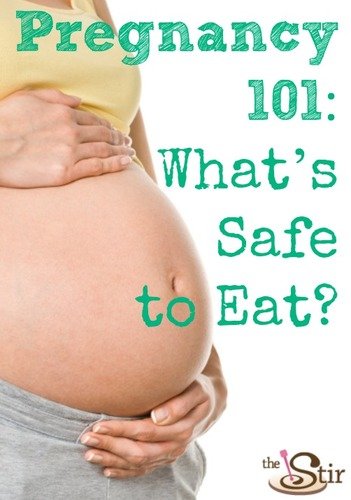As someone who is currently pregnant with my third baby, I have definitely been familiar over the years with the various foods that pregnant and nursing women are allowed (and aren't allowed) to have. In the seven years since my first pregnancy, the rules have changed. Or maybe it's more accurate to say I have changed. I don't necessarily want to be scared over every morsel of food I eat during this third pregnancy.
But what is really, truly off-limits still? What rules have changed and what really needs to stay the same? The Stir spoke exclusively to two doctors: Dr. Marc Leavey of Mercy Medical Center, who keeps a blog of interesting medical questions called String of Pearls, and Dr. Adam Wolfberg, a practicing maternal/fetal medicine specialist and associate director of medical affairs at Ariosa Diagnostics, the maker of the Harmony™ Prenatal Test.
Here are 6 foods in pregnancy for which the rules have changed over time:
1.) Soft Cheeses:
Then: Doctors used to tell their patients to avoid all soft cheeses pretty much across the board. This included Brie, Camembert, feta, queso fresco, and the like. They all may contain listeria, among other organisms, which can lead to fetal death. Scary, right?
Now: "If the cheese is made from pasturized milk, this is not a concern," says Dr. Leavey. "Most cheese sold in the United States is made from pasturized milk, making the danger less, but not absent. Imported cheeses, such as from Mexico or Europe, may have been made with raw milk, and should not be eaten. Check the labels." Good to know, right? Since most cheeses ARE made with pasteurized milk, I have been getting my cheese on and happy to do so.
2.) Sushi:
Then: "Raw sushi — no matter how fresh — should be avoided because raw fish can harbor microbes that can sicken pregnant women and potentially injure their fetus," says Dr. Wolfberg.
Now: Recently, some doctors have said that sushi is fine and generally the attitude is: Japanese women eat it while pregnant all the time. However, most doctors still err on the side of caution. All is not lost, though. "Cooked sushi is fine (and quite delicious)," says Dr. Wolfberg. "Pregnant women should avoid certain fish that contain high levels of mercury, including shark, tilefish, mackerel, swordfish, and albacore tuna (although not other types of tuna). Other fish are a great source of lean protein and are an excellent part of a pregnancy diet."

3.) Alcohol:
Then: Alcohol was pretty much the most forbidden part of any pregnancy diet and while, for most doctors, that hasn't changed, some are relaxing their stance a bit. Dr. Wolfberg is not one of them. He says: "The simple answer is that alcohol is off-limits in pregnancy. Although fetal alcohol syndrome is more likely to affect children of women who drink large quantities of alcohol throughout their pregnancy, there is no safe level of alcohol consumption during pregnancy. Pregnancy only lasts nine months: you can abstain for that long in the interests of your baby’s health."
Now: My midwife told me in both pregnancies that a glass of wine toward the end of the third trimester might help get labor started and was fine. Recent studies have shown that alcohol may not be as risky as it was once believed. But still, doctors are cautious: "An occasional drink is normally allowed, the problem comes with defining 'occasional' and 'a drink,'" says Dr. Leavey. "Better a wine glass of a low alcohol wine, such as Moscato, than a cocktail made with a few shots of something. Again, if you can abstain, fine; but the solitary drink consumed with the knowledge and assent of your physician should be okay."
4.) Coffee:
Then: Coffee was generally verboten given doctors were unsure whether it could cause miscarriage and some studies have shown that in the first trimester, it could*.*
Now: Things have changed a bit. "The good news is that coffee — in moderation — is safe. Pregnant women should feel comfortable drinking up to two cups of coffee per day," says Dr. Wolfberg.
5.) Soda/Candy:
Then: Given the tough weight constraints women used to be under (no more than 15 pounds at some point!), junk food was highly frowned upon.
Now: It's OK now, though still not ideal. "Soda and candy are like any other type of ‘junk’ food — in moderation, and in the context of a balanced diet, they are acceptable," says Dr. Wolfberg. "Women should talk to their doctor or midwife about their diet in pregnancy because conditions such as obesity or gestational diabetes can make certain foods less desirable."
6.) Cold Cuts:
Then: Cold cuts were once considered fine.
Now: "Those cold cuts from the deli may be another source of Listeria [Listeria can cause miscarriage and serious maternal illness]," says Dr. Leavey. "You can make them safer for eating by heating them up. After all, a hot steaming corned beef sandwich beats some cold slabs on bread any day! Limit the nitrates in the deli, but having the meats steamed in the microwave or toasted on the grill makes them safer."
THE BOTTOM LINE: Unless you have a very conservative doctor, most of these choices are going to be up to you. Some moms may be comfortable with some risks, but not with others. Only you can decide this for yourself.
What foods did you avoid during pregnancy?




